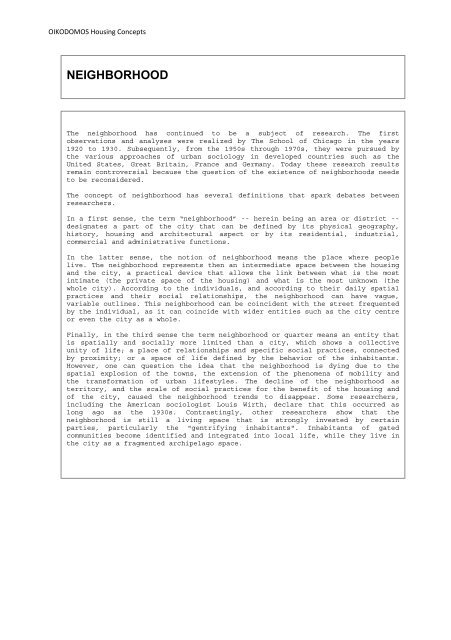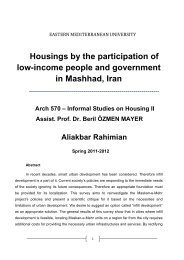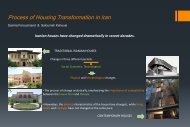Housing Concepts - Oikodomos
Housing Concepts - Oikodomos
Housing Concepts - Oikodomos
You also want an ePaper? Increase the reach of your titles
YUMPU automatically turns print PDFs into web optimized ePapers that Google loves.
OIKODOMOS <strong>Housing</strong> <strong>Concepts</strong><br />
NEIGHBORHOOD<br />
The neighborhood has continued to be a subject of research. The first<br />
observations and analyses were realized by The School of Chicago in the years<br />
1920 to 1930. Subsequently, from the 1950s through 1970s, they were pursued by<br />
the various approaches of urban sociology in developed countries such as the<br />
United States, Great Britain, France and Germany. Today these research results<br />
remain controversial because the question of the existence of neighborhoods needs<br />
to be reconsidered.<br />
The concept of neighborhood has several definitions that spark debates between<br />
researchers.<br />
In a first sense, the term “neighborhood” -- herein being an area or district --<br />
designates a part of the city that can be defined by its physical geography,<br />
history, housing and architectural aspect or by its residential, industrial,<br />
commercial and administrative functions.<br />
In the latter sense, the notion of neighborhood means the place where people<br />
live. The neighborhood represents then an intermediate space between the housing<br />
and the city, a practical device that allows the link between what is the most<br />
intimate (the private space of the housing) and what is the most unknown (the<br />
whole city). According to the individuals, and according to their daily spatial<br />
practices and their social relationships, the neighborhood can have vague,<br />
variable outlines. This neighborhood can be coincident with the street frequented<br />
by the individual, as it can coincide with wider entities such as the city centre<br />
or even the city as a whole.<br />
Finally, in the third sense the term neighborhood or quarter means an entity that<br />
is spatially and socially more limited than a city, which shows a collective<br />
unity of life; a place of relationships and specific social practices, connected<br />
by proximity; or a space of life defined by the behavior of the inhabitants.<br />
However, one can question the idea that the neighborhood is dying due to the<br />
spatial explosion of the towns, the extension of the phenomena of mobility and<br />
the transformation of urban lifestyles. The decline of the neighborhood as<br />
territory, and the scale of social practices for the benefit of the housing and<br />
of the city, caused the neighborhood trends to disappear. Some researchers,<br />
including the American sociologist Louis Wirth, declare that this occurred as<br />
long ago as the 1930s. Contrastingly, other researchers show that the<br />
neighborhood is still a living space that is strongly invested by certain<br />
parties, particularly the "gentrifying inhabitants". Inhabitants of gated<br />
communities become identified and integrated into local life, while they live in<br />
the city as a fragmented archipelago space.






